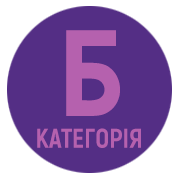THE USE OF DIDACTIC GAMES WHEN CONDUCTING CORRECTIVE CLASSES ON THE DEVELOPMENT OF SPEECH IN INCLUSIVE RESOURCE CENTERS WITH CHILDREN WHO OBTAIN EDUCATION INDIVIDUALLY (EDUCATIONAL PATRONAGE)
DOI:
https://doi.org/10.32782/inclusion/2024.spec.1Keywords:
didactic game; pedagogical patronage; design competence; pedagogical workers of inclusive resource centers; individual educational trajectory; students with special educational needs; speech activity; non-verbal children; delayed psycho-speech development; communicative activityAbstract
The article presents an analysis of the peculiarities of the use of didactic games when conducting corrective and developmental classes in inclusive resource centers. As part of the research, the documents of inclusive resource centers, lesson plans and attendance logs were analyzed, which made it possible to highlight the specifics of the use of didactic games for the development of speech and cognitive processes in children with special educational needs (SEN). Children studying under pedagogical patronage can receive correctional and developmental services in inclusive resource centers. Depending on the level of support and the child's needs, classes with a speech therapist teacher, a practical psychologist, a defectologist teacher, and a rehabilitation teacher can be prescribed. It has been established that children who study under pedagogical patronage and attend corrective and developmental classes at the IRC are children with complex developmental disorders (with intellectual disabilities, systemic underdevelopment of speech, ASD, disorders of the musculoskeletal system, etc.) and mostly with 4-5 levels of support. It is emphasized that didactic games are an effective means of speech development, allow to activate cognitive processes, stimulate interest in learning. The specifics of the use of didactic games for children with various types of disorders, in particular with cerebral palsy (CP), autism spectrum disorders (ASD), intellectual disabilities (IP), have been determined. Analyzed how games can be used to develop articulation, vocabulary, social skills, etc. An important aspect is an individual approach to each child. The effectiveness of using games largely depends on taking into account the specifics of development, interests and needs of each student. To achieve the maximum effect, it is necessary to select games that correspond to the child's level of development and his individual characteristics. The obtained data have practical value for specialists of inclusive resource centers, teachers, parents/legal representatives of children with special needs. The provided recommendations on the selection of games and their adaptation for children with severe disabilities can be used in remedial and developmental classes, lessons and during homework.
References
Bober A., KosenkoY., Korol O. Development of an interactive website with didactic games to enhance vocabulary in young students with intellectual disabilities. Information Technologies and Learning Tools. 2024. Vol 102. № 4. Р. 39–50.
Боряк О. В. Діагностика, формування й корекція мовленнєвої діяльності дітей із порушеннями інтелектуального розвитку молодшого шкільного віку: теорія і практика : монографія. Суми : Вид-во СумДПУ імені А.С. Макаренка, 2018. 458 с.
Боряк О. В., Косенко Ю. М. Мовленнєвий розвиток дітей з особливими освітніми потребами як провідний чинник соціалізації. Вісник Запорізького національного університету: збірник наукових праць. Педагогічні науки. Запоріжжя: Запорізький національний університет, 2020. № 2. С. 65–71.
Боряк О. В., Косенко Ю.М. Альтернативна комунікація як засіб розвитку мовленнєвої діяльності дітей із комплексними порушеннями. Актуальні питання гуманітарних наук. 2021. № 35. С. 264–270.
Климус Т.М., Пацута О.М. Сімейна форма навчання дітей з особливими освітніми потребами у закладах середньої та спеціальної освіти. Inclusion and Diversity. 2024. №4. С. 15–18. DOI: https://doi.org/10.32782/inclusion/2024.4.3
Косенко Ю. М. Дидактична гра як метод формування історичних понять у розумово відсталих учнів: монографія. Суми: Вид-во СумДПУ імені А. С. Макаренка, 2015. 272 с.
Косенко Ю. М., Боряк О. В., Король О. М. Застосування комп’ютерних дидактичних ігор у навчанні історії школярів з порушеннями інтелектуального розвитку в умовах інклюзивного класу. Інформаційні технології і засоби навчання. 2020. Т. 77. № 3. С. 76–89.
Миронова С. П. Методика корекційної роботи при порушеннях пізнавальної діяльності : підручник. Кам’янець-Подільський: Кам’янець-Подільський національний університет імені Івана Огієнка, 2014. 205 с.
Положення про індивідуальну форму навчання в загальноосвітніх навчальних закладах : Наказ МОН № 8 від 12.01.16 року https://osvita.ua/legislation/Ser_osv/50829/ (дата звернення: 27.10.2024).
Про освіту : Закон України від 05.09.2017 р. № 2145-VIII : станом на 06.10.2024 р. Відомості Верховної Ради (ВВР), 2017, № 38-39, ст.380. URL: https://zakon.rada.gov.ua/laws/show/2145-19#Text (дата звернення: 27.10.2024).







